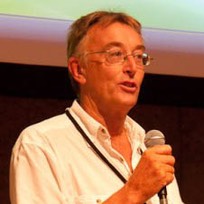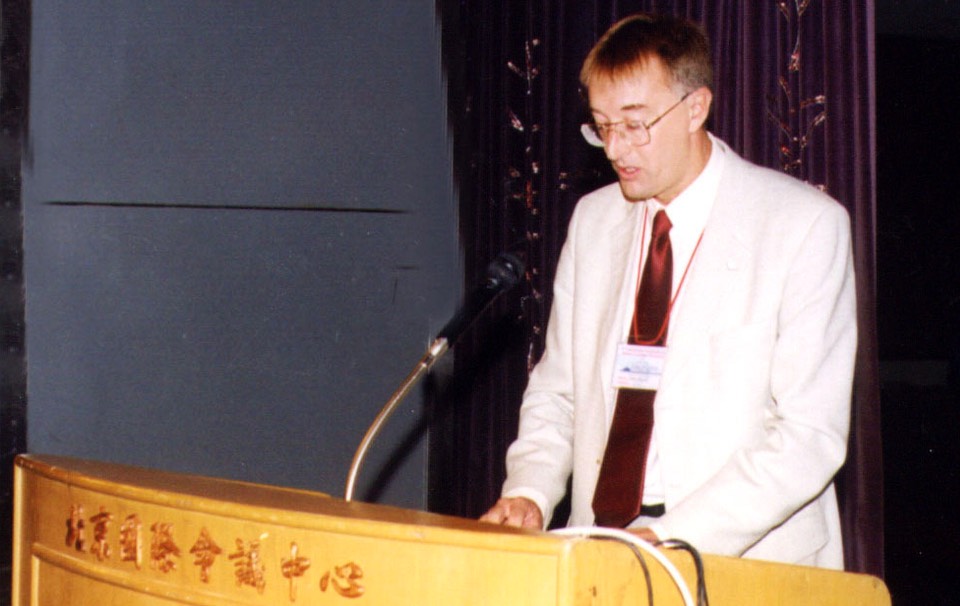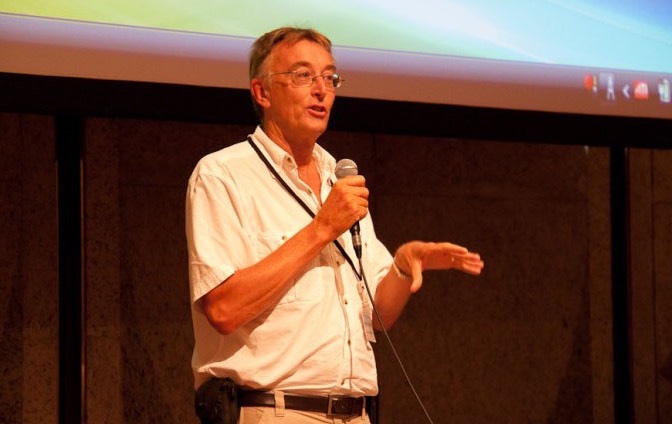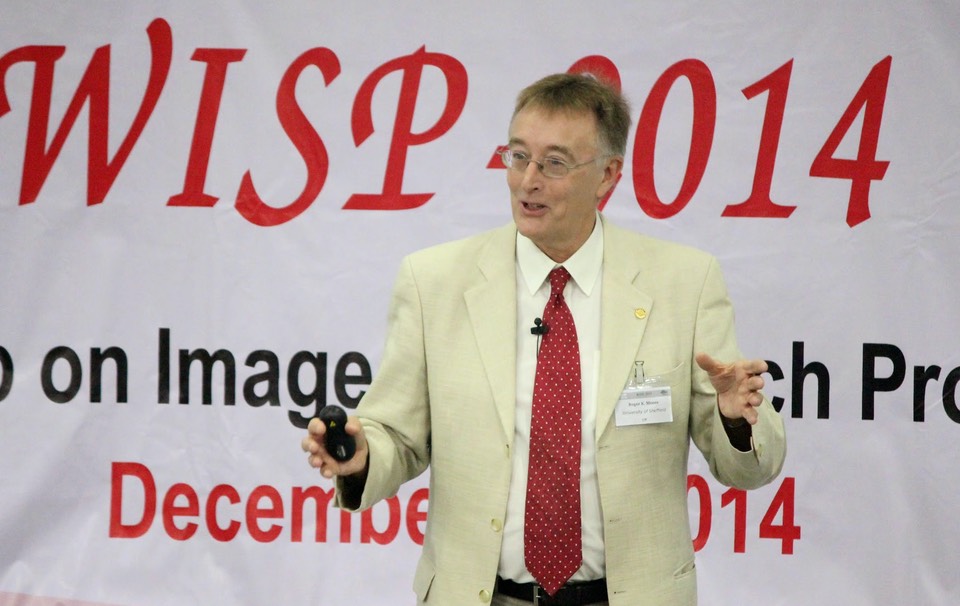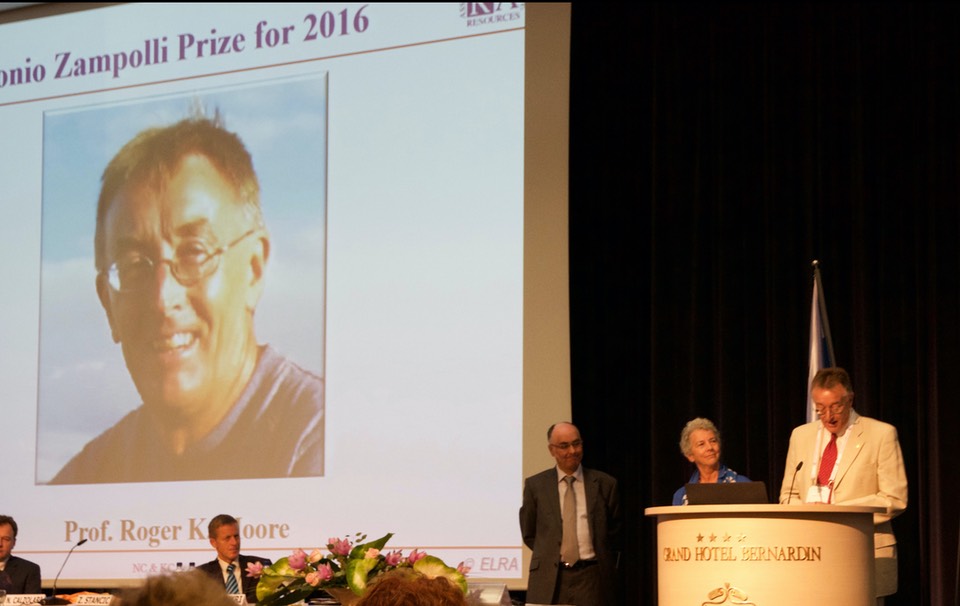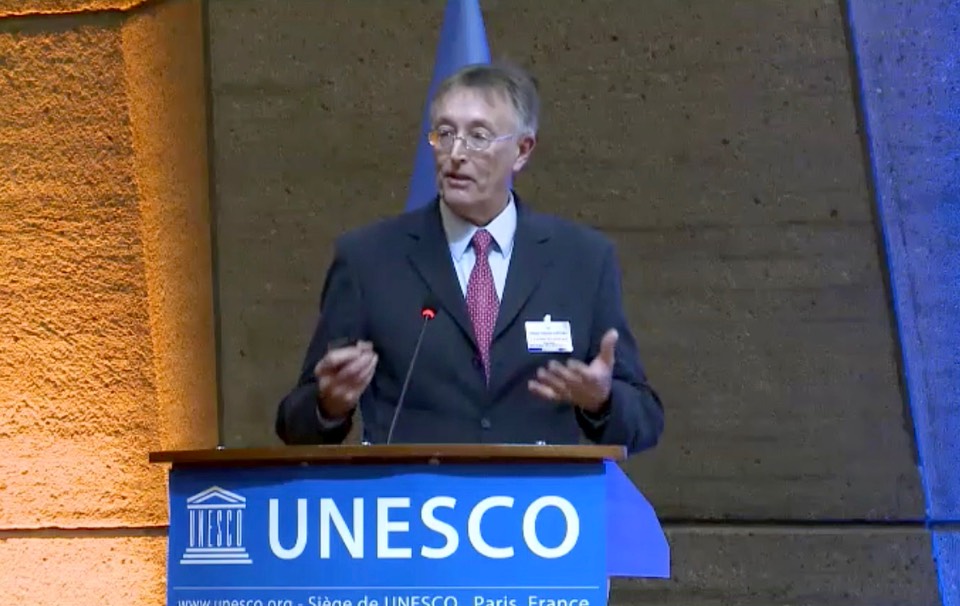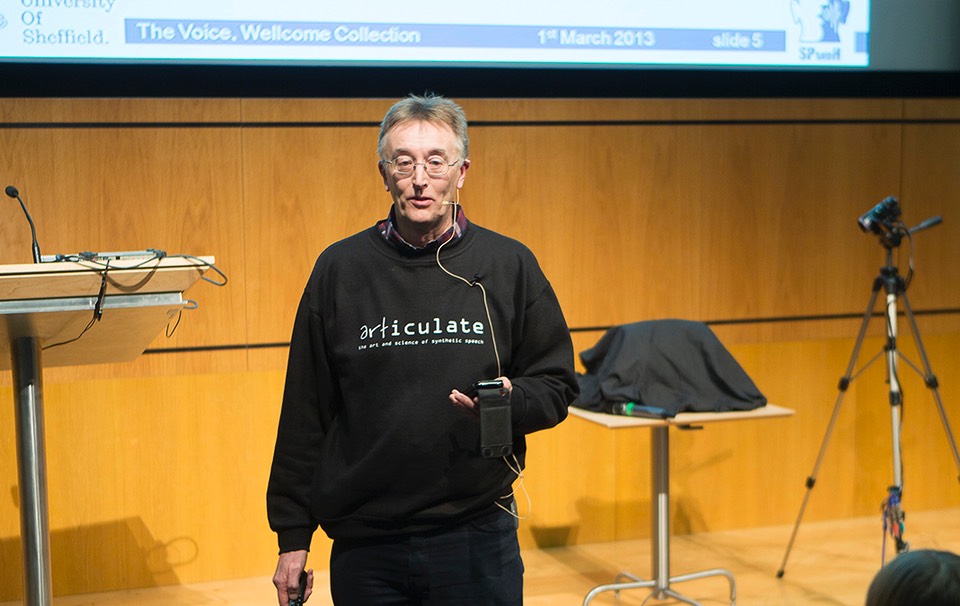KEYNOTE PRESENTATIONS
Embodied versus Disembodied Conversational Agents: two communities, one agenda? 5th International Workshop on Chatbot Research: CONVERSATIONS-2021. Oslo, Norway, 23 November 2021.
Spoken language interaction with ‘intelligent’ systems: are we nearly there yet? Human Perspectives on Spoken Human Interaction (SpoHuMa21). Freiberg, German, 15 November 2021.
Où les êtres Sociaux: vers une théorie de l’interaction communicative. (2021). 3e Colloque International - Objets Animés, Humains, Animaux : Partenaires de Soins Tendres. Grenoble, France, 6 November 2021.
Talking with Computers: Progress and Prospects, In 11th Int. Conf. on Human-Computer Interaction Design and Research - India HCI 2020.
Talking with Robots: Are We Nearly There Yet? (2020). In 29th IEEE Int. Conf. on Robot and Human Interactive Communication (RO-MAN 2020). Naples, Italy: IEEE.
Optimising communicative interaction. (2019). In Shonan Workshop on Spoken Multimodal Dialogue Systems Technology for Pervasive Computing. Shonan Village, Japan.
Talking to machines: are we nearly there yet? AI Challenges. Trondheim, Norway, 18 June 2019.
Spoken language processing: are we nearly there yet? UK Speech Conference. Dublin, 26 June 2018.
Bridging the Gap Between Humans and Machines: Lessons from Spoken Language DIGIHUM-2017. Helsinki, Finland, 4 May 2017.
Vocal Interaction with “Intelligent” Machines: Are we There Yet? Int. Workshop on Sensing, Processing and Learning for Intelligent Machines (SPLINE2016). Aalborg, Denmark, 8 July 2016.
From Isolated Digits to Social Agents: How good is good enough? Antonio Zampolli Prize Lecture, LREC 2016. Portoroz, Slovenia, 27 May 2016.
Towards spoken language interaction with “intelligent” systems: where are we, and what should we do next? IberSPEECH 2014. Las Palmas de Gran Canaria.
Spoken language Processing: Time to Look Outside?, 2nd International Conference on Statistical Language and Speech Processing (SLSP 2014). Grenoble.
Understanding spoken language understanding: from big data to real-world context., In CHIST-ERA Conference 2014. Istanbul,Turkey.
Spoken Language Interaction with 'Intelligent' Systems: How are we doing, and what do we need to do next?, EUCogII Workshop on Challenges for Artificial Cognitive Systems II. Oxford, 20-22 January (2012) [slides].
Interacting with Purpose (and Feeling!): What neuropsychology and the performing arts can tell us about 'real' spoken language behaviour, International Workshop on Paralinguistic Information and its Integration in Spoken Dialogue Systems (IWSDS2011). Granada, Spain, 2-3 September (2011). [slides]
Kõnekeele Töötlemine: Homse päeva tehnoloogia täna või tänapäeva tehnoloogia homme? (Spoken Language Processing: tomorrow’s technology today or today’s technology tomorrow?), Estonian HLT Conference, Tartu, Estonia, 25-26 November (2010). [slides]
Automatic Speech Recognition: Progress & Prospects, Association of Independent Hearing Healthcare Professionals (AHHP) Spring Conference, Leeds, 23rd February (2007).
Interaction and Language, EU IST Conference, Helsinki, 22nd November (2006).
Research Challenges in the Automation of Spoken Language Interaction, COST278 and ISCA Tutorial and Research Workshop (ITRW) on Applied Spoken Language Interaction in Distributed Environments, Aalborg University, Denmark, 10-11 November (2005).
Cognitive Informatics: The Future of Spoken Language Processing?, SPECOM - 10th Int. Conf. on Speech and Computer, Patras, Greece, 17-19 October (2005).
Spoken Language Technology: Where Do We Go From Here?, 38th Annual Meeting of the Association for Computational Linguistics (ACL'2000), Hong Kong, 3-6 October (2000).
Let's Talk Speech, UK Inst. Of Acoustics 25th Anniversary Conference, 13 May 1999, Acoustics Bulletin, vol.24, no.3, pp11-15, May/June (1999).
The EAGLES working group on spoken language (handing over the handbook), Language Engineering Convention, London, 16-18 October (1995).
Speech pattern processing: from blue sky ideas to a unified theory?, Tyndall Medal Lecture, Institute of Acoustics Conference on Speech and Hearing, Windermere, November (1994).
Twenty things we still don't know about speech, CRIM/FORWISS workshop on Progress and Prospects of Speech Research and Technology, Munich, 5-7 September (1994).
Whither a theory of speech pattern processing?, EUROSPEECH'93, Berlin, 21-23 September (1993).
DISTINGUISHED LECTURES
On Speaker-Listener-Environment Coupling: Implications for Computational Models of Spoken Language. ISCA Distinguished Lecture, Research Symposium at Shanghai Jiao Tong University. Shanghai, China (August 2015).
Progress & Prospects in Spoken Language Processing. ISCA Distinguished Lecture, UK-Sino Summer School on Corpus Linguistics. Shanghai Jiao Tong University, Shanghai, China (August 2015).
Speech technology: How it works (and why it sometimes doesn’t!). ISCA Distinguished Lecture. Polytechnic University of Puerto Rico (January 2015).
Towards spoken language interaction with “intelligent” systems: where are we, and what should we do next? ISCA Distinguished Lecture. Polytechnic University of Puerto Rico (January 2015).
Beyond Siri: Towards the Next Generation of Talking and Listening Machines. ISCA Distinguished Lecture. University of Puerto Rico Mayaguez, Polytechnic University of Puerto Rico, Turabo University (January 2015).
On Speaker-Listener-Environment Coupling: Implications for Computational Models of Spoken Language. ISCA Distinguished Lecture at WISP-2014. Hyderabad, India (13 December 2014).
Beyond Siri: Towards the Next Generation of Talking and Listening Machines. ISCA Distinguished Lecture. Guwahati/Bangalore, India (10/15 December 2014).
Computers that Talk and Listen. York University Public Lecture series (14th November 2012).
Spoken language processing: where do we go from here?, SEERC, Thessaloniki (11th February 2010).
Spoken language processing: where do we go from here?, WISP-2008 Workshop on Image and Speech Processing. Hyderabad, India.
Spoken language processing: where do we go from here?, Chinese University of Hong Kong, 22nd November (2007).
Computer Speech Recognition: a viable technology?, AGM of the National Association of Deafened People, Nottingham, 17 June (2006).
INVITED TUTORIALS
'Speech 101' - what everyone working on spoken language processing needs to know about spoken language, INTERSPEECH-2020, Shanghai, 25 October (2020).
The Uncanny Valley: what it is, why it matters, and how we might be able to avoid it, International Summer School on Social Human-Robot Interaction2015. Aland, Finland, 24-28 August (2015).
The Uncanny Valley: what it is, why it matters, and how we might be able to avoid it, International Summer School on Social Human-Robot Interaction, Christ's College, University of Cambridge, 26-30 August (2013).
Individuality & emotion in speech and language: implications for artificial conversational agents, 4.5hr Tutorial at 22nd Vilem Mathesius Lecture Series/Companions Fall School. Prague (2008).
Speech Recognition by Mind and Machine (with Anne Cutler), 3hr Tutorial at INTERSPEECH 2008, Brisbane, September (2008).
How to Give a Good Presentation, Invited talk to students at INTERSPEECH 2007, Antwerp, August (2007).
Spoken Language Processing by Mind and Machine (with Anne Cutler), 3hr Tutorial at INTERSPEECH 2007, Antwerp, August (2007).
Spoken Language Processing: Separating Science Fact from Science Fiction, 3hr tutorial at the 41st Annual Meeting of the Association for Computational Linguistics (ACL 2003), Sapporo Convention Center, Sapporo, Japan, 7-12 July (2003).
Assessment of Speech Input Systems, Proc. ESCA Tutorial Day on Speech Input/Output Assessment, Noordwijkerhout, Holland, 20 Sept. (1989).
Stochastic modelling for speech pattern processing, Univ. of Essex short course on Speech Processing, 14-18 March (1988).
Stochastic modelling, DSAC Seminar on Pattern Recognition and Data Fusion, 26-27 January (1988).
Advances in speech pattern processing, Summer School on Speech, Sound and Hearing Research, Bollerup Castle, Sweden, 7 August (1986).
Systems for isolated and connected word recognition, NATO ASI on New Systems and Architectures for Automatic Speech Recognition and Synthesis, Bonas, France, 2-14 July (1984).
Assessment of speech systems, AGARD Lecture Series No.129 on Speech Processing, Norway-Denmark-Holland, 20-28 June (1983).
Techniques for automatic speech recognition, AGARD Lecture Series No.129 on Speech Processing, Norway-Denmark-Holland, 20-28 June (1983).
INVITED CONFERENCE/WORKSHOP PRESENTATIONS
Talking with Robots: Opportunities and Challenges. (2019). In International Conference Language Technologies for All (LT4All). Paris, France: Unesco.
Closed-loop control within-and-between interlocutors: implications for computational models of spoken language interaction. (2019). In SimPhon.Net. Konstanz, Germany.
Talking to machines: are we nearly there yet? In AI Challenges Conference. Trondheim, 18 June 2019.
Intentionality in speech: implications for computational models. interACT-25. Baden Baden, Germany, (2016).
Mutual Beliefs Desires Intentions Actions and Consequences (MBDIAC): Towards A Computational Framework for “Intelligent” Interactive Agents. CogInfoCom 2014: “Multimodal Communicative Signals: Behavioural and Algorithmic Issues” LangTERRA project. Vietri sul Mare, Italy, 7 November (2014).
Speech technology: past, present, and technology transfer. Sixth EUCogIII Members Conference. Genoa, Italy, 18 October (2014).
Towards Communicative Machines. AISB-50 Symposium on Embodied vs. Simulated Behaviour and Cognition: What can Robotics contribute to the Language Sciences? London, 4 April (2014).
Interpreting intentional behaviour. In Dagstuhl Seminar 13451 on Computational Audio Analysis. Dagstuhl, Germany, November (2013).
Progress & prospects for speech technology: what ordinary people think. INTERSPEECH special session celebrating the 25th anniversary of ISCA, Lyon, 29th August (2013).
Talking with Machines. The Voice, Wellcome Collection, London, 1st March (2013).
Speaking and Listening Machines: Siri and beyond. The Voice Symposium, London Science Museum's Dana Centre, 16th November (2012).
Some insights into talker-listener-environment coupling, energetics and the contrastive particulate structure of spoken language, The Listening Talker - an interdisciplinary workshop on natural and synthetic modification of speech in response to listening conditions. Edinburgh, May (2012).[slides][mp3]
Do robots need cognition, and does cognition need robots: a response to Matthias Scheutz. EUCog III Meeting, Vienna, February (2012).
Discovering the particulate structure of speech, Workshop on Developmental Speech Recognition. Bielefeld, February (2011). [slides]
Response to F. Cummins: "Looking for rhythm in speech", British Psychological Society Language & Music Seminar on Entrainment & Meaning. Cambridge, December (2010).
Progress and prospects for speech technology: results of a survey, IEEE Workshop on Automatic Speech Recognition and Understanding. Moreno, Italy, December (2009).
Speech and emotion, FET09: European Future Technologies Conference. Prague (2009).
PREdictive SENsorimotor Control and Emulation (PRESENCE): Implications for Future Spoken Language Technology, CONTACT International Workshop on 'Is a neural theory of language possible? Development of unified representations in natural and artificial systems', Lecce, Italy, 28-30 June (2007). [video (180 Mbytes!)]
Sensorimotor Overlap in Living Organisms, One Day Meeting on 'Unified Models for Speech Recognition and Synthesis', University of Birmingham, 11th January (2007).
The Future of Spoken Language Technology: Does it Have One?, The Society for Research in Rehabilitation (SRR) Winter Conference, Sheffield, 8th February (2007).
Speculating on the Future for Automatic Speech Recognition, Invited talk on a survey of attendees, IEEE workshop on Automatic Speech Recognition and Understanding (ASRU), St. Thomas, US Virgin Islands, 1-4 December (2003).
Progress, Promises and Prospects for Automatic Speech Recognition, UKCoD/NADP Conf. on New Technologies in Communication for Deaf People', London, 4th October (2005).
Predicting the Future of Speech Technology: speculation & trends, LangTech 2004, Paris, 24-25 November (2003).
Towards a Theory of Speech Recognition: bridging ASR & HSR, Workshop on 'Innovative Approaches Bridging Automatic and Human Speech Recognition', University of Nijmegen, 17 November (2003).
Spoken Language Output: Realising the Vision, ELSNET Special Session 'Towards a Roadmap for Speech Technology', EUROSPEECH'03, Geneva, pp. 2909-2912, 1-4 September (2003).
The Future of Speech-Based Services: Bringing in the Benefit, COST249 workshop on Voice Operated Telecom Services (VOTS2000), Gent, 11-12 May (2000).
Speech Recognition Systems: Present and Future, opening lecture, Heraeus Seminar, Bad Honef, 3-5 April (2000).
Dictation and Voice Control, IEE Colloquium on Speech and Language Engineering, 19 November (1998).
Roadmap of challenges and achievements in speech processing, with focus on the contribution of EU speech projects, EU Speech Projects Day, Rhodes, 22 September (1997).
Where do we go from here?, NATO Advanced Study Institute on Computational Models of Speech Pattern Processing, Jersey, 7-18 July (1997).
What is speech pattern processing?, NATO Advanced Study Institute on Computational Models of Speech Pattern Processing, Jersey, 7-18 July (1997).
Moving speech recognition from the lab to real world environments: challenges and solutions, IIR Conference on Speech Recognition and Text-to-Speech, London, 14 February (1996).
Computational phonetics, XIIIth International Congress of Phonetic Sciences, Stockholm, 13-19 August (1995).
Pre-lexical processing: a view from ASR, Workshop on Methods and Models of Spoken Word Recognition, Max-Planc Institute, Nijmegen, 26-27 January (1995).
Topic spotting in speech, SALT Club meeting on Information Retrieval, 3-4 January (1995).
Speech technology response to speech production models in automatic speech recognition, Special session on Speech Recognition and Perception from an Articulatory Point of View, Acoustical Society of America, Boston, June (1994).
Are current technologies up to the challenge?, COST workshop on Speech Recognition Over the Telephone, Rome, 5-6 November (1992).
The state-of-the-art in speech, ELSNET/SALT workshop on Integrating Speech and Natural Language, Dublin, July (1992).
The future for standards in speech technology, NPL workshop on Standards and Methods in Speech Technology Assessment, 7 July (1992).
User needs in speech research, Proc. workshop on European Textual Corpora, Pisa Italy, 23-26 January (1992).
Speech recognition: available assessment methods and needs for standardisation, Workshop on International Co-operation and Standardisation of Speech Databases and Speech I/O Assessment Methods, Chiavari Italy, 26-28 September (1991).
International co-ordination of research standards in speech science and technology, ICSLP-90 workshop on International Co-ordination of Spoken Language Database and Assessment Techniques for Speech Input/Output, Kobe Japan, November (1990).
The technology of speech recognition, CCTA/Blenhiem-Online Conf. on Knowledge Based Systems in Government, Bristol, 8-10 Nov. (1988).
The future of speech systems, IFS Executive Briefing on Speech Technology in Industry', London, 1 Nov. (1988).
SALTUS-2000 - speech and language technology: a UK strategy, special address, FASE conference, Speech 88, Edinburgh, 22-26 August (1988).
Automatic speech recognition: past, present and future, 2nd Franco-Brittanic Meeting on Speech, Univ. Sussex, 4-6 July (1988).
The Institute of Acoustics Speech Group, 1st French-British Meeting on Speech, Lannion, France, 3-5 June (1987).
Experiences in performance evaluation, Speech Tech'86, New York, USA, 28-30 April (1986).
Some relationships between Boltzmann machines and current algorithms for automatic speech recognition, Joint Inst. Acoustics Speech Group / British Pattern Recognition Assoc. Meeting, London, 7 January (1985).
Overview of speech input, IFS Conf. on Speech Technology, Brighton, October (1984).
Assessment activities in automatic speech recognition, Inst. Acoustics Speech Group Workshop on Speech Input/Output Assessment, London, 1 December (1983).
Talking to machines, British Association for the Advancement of Science Conf., Liverpool, 10 September (1982).
Military and civil applications of automatic speech recognition, SERC Speech Recognition Workshop, Didcot, 15 July (1982).
Speech recognition at RSRE, IEE Colloquium on The Computer Recognition of Speech, London, 18 May (1981).
Speech recognition systems and theories of speech perception, Conference on The Cognitive Representation of Speech, Edinburgh (1981).
INVITED TALKS, LECTURES & SEMINARS
Embodied versus Disembodied Conversational Agents: two communities, one agenda? (2022). In AI and Human Systems” (AIHS) Seminar Series, Durham University. Durham.
Talking with Robots: Are We Nearly There Yet? Webinar at HiTZ (Basque Center for Language Technology), 3 February 2022.
Spoken language technology now seems to work - so what’s left to be done? Technische Universität Berlin, 19 May 2021.
Spoken language technology now seems to work - so what’s left to be done? (2020). In UCL Speech Science Forum. London.
What Do Users Want/Need? In NSF Workshop, USER: Toward User-Oriented Agents: Research Directions and Challenges. Pittsburgh, PA, USA.
Vocal Interaction with “Intelligent” Machines: Are We Nearly There Yet? University of Trento, Italy, (2019).
When will we be able to hold a decent conversation with a robot (and what would we talk about anyway)? Institute of Physics public lecture, University of Birmingham, (2016).
Robots: Emotional Companions?, panel discussion chaired by Rory Cellan-Jones, with Kerstin Dautenhahn and Noel Sharkey, Cheltenham Science Festival, 8th June (2016).
On Speaker-Listener-Environment Coupling: Implications for Computational Models of Spoken Language. Seminar. Birmingham, 6th May (2016).
Mutual Beliefs Desires Intentions Actions and Consequences (MBDIAC): Towards a Computational Framework for “Intelligent” Interactive Agents. Sheffield Robotics Seminar, 9thFebruary (2016).
On Speaker-Listener-Environment Coupling: Implications for Computational Models of Spoken Language. UCREL Corpus Research Seminar. Lancaster, 21st January (2016).
Beyond Siri: Towards the Next Generation of Talking and Listening Machines. University of Sheffield Engineering Symposium (USES). Sheffield, 24th June (2015).
Beyond Siri: Towards the Next Generation of Talking and Listening Machines. Cognition Colloquium. Plymouth, 20th April (2015).
Mutual Beliefs Desires Intentions Actions and Consequences (MBDIAC): Towards a Computational Framework for “Intelligent” Interactive Agents. Cognition Colloquium. Plymouth, 20th April (2015).
On Speaker-Listener-Environment Coupling: Implications for Computational Models of Spoken Language. GIPSA Lab. Grenoble, 8 October (2014).
When will we be able to hold a decent spoken conversation with a robot (and what would we talk about anyway)?Sheffield Festival of the Mind, 24 September (2014)..
The Uncanny Valley: what it is, why it matters, and how we might be able to avoid it, School of Computing, University of East Anglia, 7 May (2014).
The Uncanny Valley: what it is, why it matters, and how we might be able to avoid it, South East European Research Centre, Thessaloniki, 18 February(2014).
Spoken language processing: where do we go from here?School of Computer Science, University of Coventry, 13th February (2013).
Spoken language processing: where do we go from here?University of Lincoln, 25th April (2012).
Progress & prospects in spoken language processing. Institite of Acoustics Speech & Hearing AGM, London, 20th April (2012).
Spoken language processing: where do we go from here?Science and Technology Research Institute, University of Hertfordshire, 14th March (2012).
Spoken language processing: where do we go from here?School of Computer Science, University of Birmingham, 1st March (2012).
Progress & prospects in spoken language processing. LanG network, Glasgow University, 23rd May (2011).
Speech technology: How it works (and why it sometimes doesn't!). Modern Languages Teaching Centre, University of Sheffield, 23rd March (2011).
Progress and prospects in spoken language processing. Materials and Engineering Research Institute, Sheffield Hallam University, 21st March (2011).
Spoken language processing: where do we go from here?McGill University, Montreal, Canada, 21st June (2010).
Towards cognitively-inspired spoken language processing. Bristol Robotics Laboratory, 19th May (2010).
Speech processing for sound artists: a review of speech technology. London College of Communication, 17th February (2010).
Spoken language processing: where do we go from here?, Dept. Psychology, Manchester University, 4th February (2010).
Spoken language processing: where do we go from here?, SCALE Winter Workshop, Saarland University, Saarbrucken, 12th January (2010).
Spoken language processing: where do we go from here?, Robotics and Intelligent Systems Group, Plymouth University (March 2009).
Choosing the Best Analysis Unit for Speech Processing: a speech technology perspective, 'Sound to Sense' (S2S) project meeting. Naples, April (2008).
Persona: personality and emotion, COMPANIONS project meeting, Paris, September (2007).
Spoken Language Processing: where do we go from here?, Cambridge University Engineering Dept., May (2007).
The Recognition Problem May Not be a Recognition Problem, special symposium on the occasion of Lou Boves' 60th birthday, Radbound University of Nijmegen, 6 April (2006).
The Implications of Perceptual Control Theory for (Computational) Models of Spoken Language Processing, the Academic Department of Psychiatry, University of Sheffield, March (2006).
How good does ASR need to be … and when will it be that good?, Dundee University, February (2006)
How good does ASR need to be … and when will it be that good?, Dept. Human Communications Studies, Sheffield, May (2005)
How good does ASR need to be … and when will it be that good?, UEA Norwich, November (2004)
How good does ASR need to be … and when will it be that good?, ITRI Brighton, November (2003)
How good does ASR need to be … and when will it be that good?, Birmingham University, October (2003)
How good does ASR need to be … and when will it be that good?, Tokyo Institute of Technology, July (2003)
How good does ASR need to be … and when will it be that good?, ATR Kyoto, July (2003)
How good does ASR need to be … and when will it be that good?, University College London, June (2003)
How good does ASR need to be … and when will it be that good?, Edinburgh University, May (2003).
Towards human performance in automatic speech recognition, UCL Phonetics Dept., 19 February (1998).
Moving speech technology from the lab to real-world applications: challenges and solutions, University of Trondhiem, Norway, 3 February (1998).
Twenty things we still don't know about speech, Institute for Language, Speech and Hearing, Sheffield, 8 October (1997).
Structured modelling of speech and non-speech signals, MRC Applied Psychology Unit, 27 April (1989).
Research issues in automatic speech recognition, Exeter University, 16 May (1986).
Research issues in speech pattern modelling, Cambridge M.Phil Course, February (1986).
Trends in speech pattern modelling, Institute of Hearing Research, Nottingham, November (1985).
